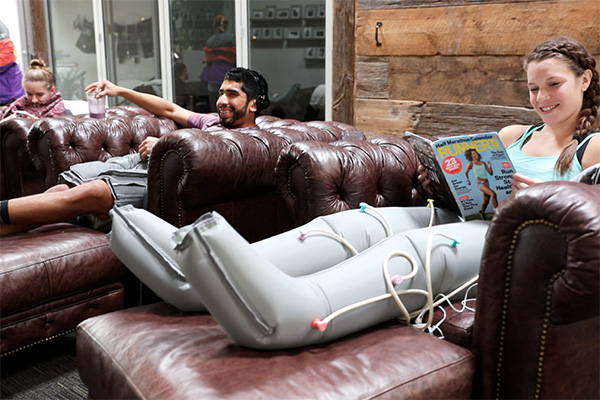Step into the new CrossTown Fitness in Roscoe Village (3406 N. Lincoln Ave.)—the gym’s third location—and you’ll first notice the massive weight racks dominating the 3,500-square-foot space. Now, members can lift even heavier during CrossTown’s personal training sessions and famously high-intensity, total-body classes.
But don’t overlook the small, quiet room in the back. There, says fitness director Stephanie Rountree, reside tools just as critical to getting results—foam rollers, vibrating Hyperice-brand massage balls, and inflatable Normatec compression boots.
Recovering properly from tough workouts can prevent injury and burnout, fitness experts say, and CrossTown is one of many local facilities incorporating opportunities for restoration directly into their offerings. “I think having it right there makes people realize how important it is,” Rountree says.
If you’re training hard for a race or hitting CrossTown classes five or six days a week, you’re essentially placing your system under stress. That’s not necessarily bad—in fact, that’s how exercise improves your strength and fitness in the first place, says Jeremy Fransen, Ph.D., director of the Exercise Science Program at North Central College in Naperville.
After each workout, your body replenishes the energy you expended and heals damaged tissues. At first, you’re sore and tired—but a day or two later, you bounce back stronger. “It’s a protective mechanism for the body to say, ‘OK, I was hit hard with this workout; I’m going to adapt so if I get hit with that same workout again, I’ll be ready for it,’” Fransen says.
The key, he says, is striking the right balance—working only as hard as your body can handle and allowing ample time to recuperate in between sessions. Recovery tools and classes aim to speed the process. Stretching and foam-rolling relieves tension in muscles and increases your range of motion. Compression boots like those at CrossTown use air-filled bladders to squeeze sections of your legs one by one, boosting blood flow and promoting the circulation of lymph, the fluid that transports healing immune cells through the body.
Alternating between an ice bath and a hot tub, as you can do at recovery-focused EDGE Athlete Lounge (1747 N. Elston Ave.), creates a flushing effect by dilating, then constricting your blood vessels. All this means you’re feeling better faster and can train again sooner (and harder), says running coach and EDGE owner Robyn LaLonde.
Recover at one of these Chicago gyms and studios—or, save cash and do it at home by picking up a foam roller or lacrosse ball, alternating between warm and cold water in the shower, or firing up a yoga video on YouTube, Fransen suggests. And don’t neglect healthy eating, hydration, and sleep, he notes—perhaps the most cost-effective recovery tools available.
- Recovery Room sessions at CrossTown Fitness Roscoe Village, $10 each or $40/month unlimited use; later this spring, they’ll add whole-body cryotherapy.
- Balance the hour-long treadmill-and-weight workouts at Barry’s Bootcamp River North with RELEASE, a 55-minute stretching and mobility; $30 single class, with packages and memberships also available.
- Recovery Lounge at On Your Mark Coaching + Training (1101 W. Monroe), $20 for up to an hour with compression boots and foam rollers.
- Memberships to EDGE Athlete Lounge—which include strength classes, bike trainers and treadmills, and recovery tools—begin at $124.99; day passes, $20.
- Studio Three (648 N. Clark St.) offers Performance Stretch, a 60-minute session using blocks, straps, and lacrosse or tennis balls, each Sunday at 11:45 (drop-ins $26, or $13 for first-timers, with packs and memberships available).



